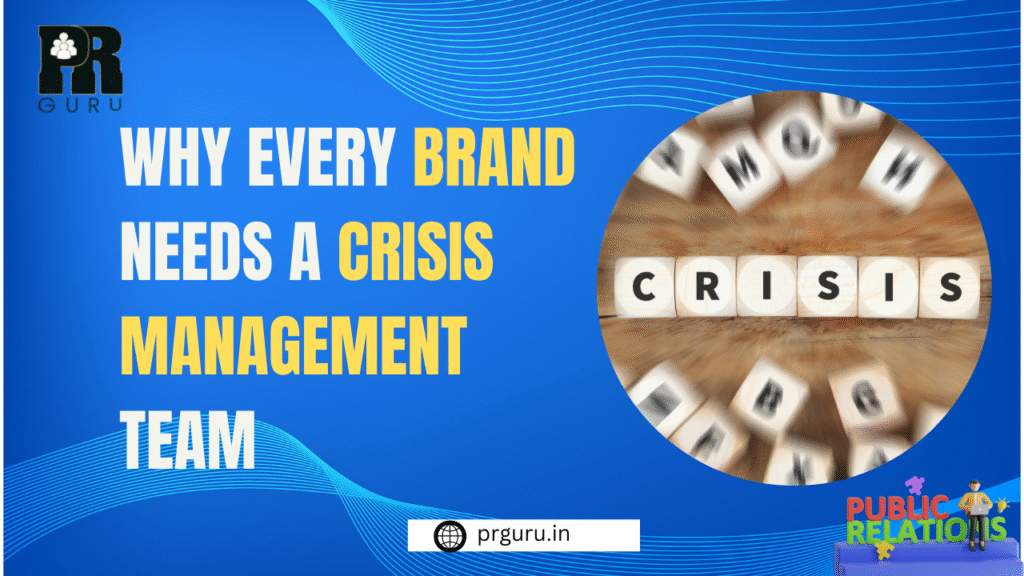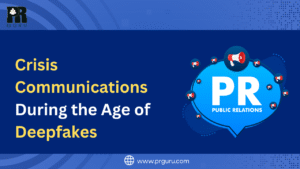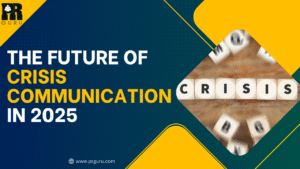Why Every Brand Needs a Crisis Management Team—and How to Build One
Role of Crisis Management in PR
By PR-Team | May 2, 2025 | Reputation Management

Reputation is everything in the fast-moving world of business. One dissatisfied influencer, a negatively handled incident, or a very negative tweet could snowball into full-blown disaster. For brands working to maintain that credibility and that trust, no longer is an optional crisis management team, but something of necessity for every brand: let’s understand why and learn how to establish an effective one.
Role of Crisis Management in PR

PR stands for Public Relations, which is the art of managing how a brand is perceived by its audience. In a crisis, it serves as the shield and sword by defending the reputation of the brand and reshaping the narrative. The well-prepared crisis management team ensures:
Reputation protection: Brands invest a lot in reputation building, and a single crisis can destroy all the investments. Quick, calculated responses can prevent long-term damage.
Stakeholder trust: Consumers, investors, or employees do not need any assurances during uncertain times. The assured communication along with the proactive campaign can actually calm nerves and reinforce trust.
Business continuity: A mishandled crisis can result in financial losses, legal issues, and operational disruptions. Effective crisis management minimizes these impacts.
Real-World Examples of Crisis Mismanagement
Let us take the examples of the Kendall Jenner Pepsi advert or the United Airlines passenger removal scandal. Such incidents reflect how crisis management could have erupted into a viral backlash that led to the compromise of consumers’ trust. The takeaway lesson is that prevention and preparation are better than cure.
How to Build a Crisis Management Team: A Step-by-Step Guide
1. Gather the Right People
A successful crisis management team starts with its makeup. Consider having the following representatives on board:
Public Relations: To draft and disseminate messages to the media and public.
Legal: To ensure compliance and avoid possible lawsuits.
Executive Leadership: To give authority and make final decisions.
Social Media Specialists: To monitor and manage online conversations in real time.
2. Develop a Crisis Plan

Your team’s success will be based on a well-thought-out crisis management plan. It should include:
Risk Assessment: Identify potential vulnerabilities within the brand, such as product recalls or customer service issues.
Response Protocol: Outline the chain of command and the steps to take in various scenarios.
Message Framework: Develop templates for responses to maintain a consistent tone.
3. Monitor and Detect Early Signs
Crisis management begins with identifying potential threats before they escalate. Invest in
Social Listening Tools: Platforms like Brandwatch or Mention help track brand mentions and sentiment in real time.
Media Monitoring: Stay updated on news outlets and industry reports to spot emerging issues.
4. Train Your Team

Even the best plan can fall apart without proper execution. Regular training ensures your team is prepared to respond effectively. Conduct:
Mock Drills: Simulate crises to test your team’s preparedness.
Workshops: Have PR and lawyers come in to share insights and best practices.
5. Keep Communicating
In a crisis, quiet can be viewed as guilt. Communicate right away, but do not do so hastily; the last thing you want to do is escalate the situation with your words. Key guidelines:
Empathy First: Acknowledge the problem and express concern about those affected.
Transparency: Share what you know and say you will give updates.
Consistency: Use all communication vehicles—press releases, social media, and emails—in the same tone.
6. Learn and Adapt Post-Crisis

Once the storm has passed, take a hard look at yourself. Perform a post-mortem of how things went down—the high points, the low points, and what could be done differently.
Benefits of a Crisis Management Team
More Positive Brand Reputation: Managing crises quickly and strategically can transform foes into friends.
Operational Stability: Stop Derailment of Daily Activities
Competitive Advantage: A brand that handles a crisis is usually perceived as one that can be relied on and acted professionally with.
Conclusion
No brand is immune to crises in today’s interconnected digital age. Building a strong crisis management team is a proactive step to safeguard your reputation and ensure long-term success. Remember this golden rule as a PR guru: A crisis well-managed is an opportunity well-leveraged.
Stay prepared, stay resilient, and your brand will not just survive crises but emerge stronger from them.
Also Read: Top 5 Tips to Elevate Your Media Pitch and Make a Lasting Impression
Ready to take your PR strategy into 2025 and beyond? Visit PRGuru.in to find out how we can partner together to make your brand unforgettable.
Build authority, trust, and engagement with the right PR moves! Follow PR Guru on LinkedIn for expert tips, success stories, and industry trends








